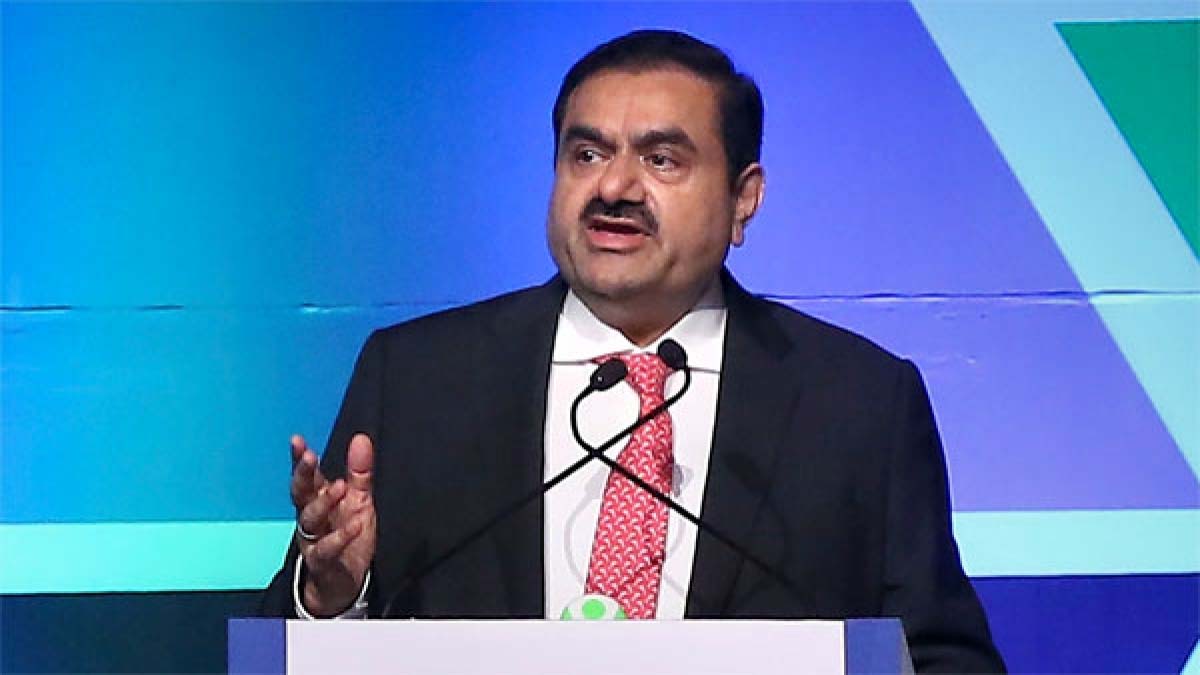- Home
- Billionaires
- Investing Newsletters
- 193CC 1000
- Article Layout 2
- Article Layout 3
- Article Layout 4
- Article Layout 5
- Article Layout 6
- Article Layout 7
- Article Layout 8
- Article Layout 9
- Article Layout 10
- Article Layout 11
- Article Layout 12
- Article Layout 13
- Article Layout 14
- Article Sidebar
- Post Format
- pages
- Archive Layouts
- Post Gallery
- Post Video Background
- Post Review
- Sponsored Post
- Leadership
- Business
- Money
- Small Business
- Innovation
- Shop
Recent Posts
Gautam Adani: The Rise of India’s Infrastructure Tycoon

Gautam Adani, one of India’s most prominent and influential industrialists, has carved an extraordinary path in the world of business and infrastructure. Known for his ambitious vision and bold ventures, Adani has emerged as a symbol of modern Indian capitalism. His journey from a modest background to becoming the head of one of India’s largest conglomerates exemplifies determination, strategic thinking, and entrepreneurial brilliance.
Born on June 24, 1962, in Ahmedabad, Gujarat, Gautam Adani came from a middle-class Jain family. His father, Shantilal Adani, was involved in the textile business, which gave young Gautam an early exposure to trade. However, Adani was not inclined to join his father’s business. After completing his schooling, he enrolled at Gujarat University to pursue a degree in commerce, but he dropped out after the second year. Despite not completing formal education, Adani possessed a sharp business acumen and a keen interest in the trading sector.
Adani moved to Mumbai in the early 1980s to work as a diamond sorter for Mahendra Brothers. This experience in the fast-paced diamond industry taught him valuable lessons in risk-taking and global trade. After gaining initial business experience, he returned to Ahmedabad and started a small commodity trading business. In 1988, he established Adani Exports, which later became Adani Enterprises. Initially, the company focused on agricultural and power commodities, but Adani’s vision extended far beyond simple trade.
Gautam Adani’s defining business philosophy was to integrate operations vertically and expand infrastructure in a country that was rapidly developing. In the 1990s, as India liberalized its economy, Adani seized the opportunity to expand. He entered the infrastructure sector, particularly ports and logistics, a move that would define his career. In 1995, Adani’s company secured a contract to operate Mundra Port in Gujarat, which would later become India’s largest commercial port. The transformation of Mundra from a sleepy coastal region into a bustling industrial and logistics hub marked the beginning of Adani’s meteoric rise.
Adani Group diversified aggressively under Gautam Adani’s leadership. It ventured into power generation, transmission, natural gas distribution, mining, renewable energy, airports, data centers, and defense manufacturing. Each of these ventures was aligned with India’s national priorities, allowing the group to expand rapidly. Notably, Adani Green Energy became one of the world’s largest renewable energy companies, aligning with global trends in sustainability and clean energy.
Despite controversies and political scrutiny, particularly surrounding his close proximity to political power, Adani continued to grow his business empire. His relationship with successive state and national governments was often seen as symbiotic, with his infrastructure projects supporting national development and, in return, receiving strategic support. Critics have accused Adani of benefiting disproportionately from government policies, while supporters argue that his contributions to India’s infrastructure and energy security are invaluable.
Adani’s leadership style is marked by bold decision-making and an unrelenting focus on execution. He is known to empower his leadership team while maintaining tight control over major strategic decisions. Under his guidance, the Adani Group has embraced technology and innovation, especially in sectors like solar energy and digital infrastructure. His vision is not just limited to India; the group has expanded its global footprint with strategic acquisitions and investments in countries like Australia, Indonesia, and Sri Lanka.
One of the most significant milestones in Adani’s journey came in 2022, when he briefly became the world’s third-richest person, according to Forbes and Bloomberg Billionaires Index. This achievement was remarkable not only because of his background but also because most of his wealth was rooted in sectors like infrastructure and energy, rather than technology. This ascent highlighted the growing significance of emerging-market billionaires and the shifting global economic landscape.
However, 2023 brought serious challenges to Gautam Adani and his group. A U.S.-based investment firm, Hindenburg Research, published a report accusing the Adani Group of stock manipulation and accounting irregularities. The report led to a sharp decline in Adani Group stock prices and triggered intense media scrutiny and regulatory examination. Adani categorically denied the allegations and took steps to reassure investors, including repaying loans, improving corporate governance, and increasing transparency. The crisis tested Adani’s resilience and his ability to navigate turbulent waters, and while the group’s market value suffered in the short term, Adani’s long-term strategic focus remained unshaken.
Despite setbacks, Adani remains committed to nation-building and creating long-term value. His companies continue to work on key infrastructure projects, such as renewable energy parks, green hydrogen facilities, and smart ports. Adani believes that India’s economic future hinges on robust infrastructure, energy independence, and digital innovation—all areas where the group is actively involved.
Philanthropy is also an integral part of Gautam Adani’s legacy. Through the Adani Foundation, he and his family support various initiatives in education, healthcare, rural development, and disaster relief. The foundation has impacted millions of lives across India and reflects Adani’s belief in inclusive growth and social responsibility.
Gautam Adani’s life is a testament to the power of ambition, strategic foresight, and relentless execution. From a college dropout and diamond trader to one of the world’s most powerful businessmen, his story continues to inspire a new generation of Indian entrepreneurs. Despite facing criticism and controversy, Adani has remained focused on his mission to build infrastructure that can transform economies and empower societies. As India continues its journey toward becoming a global economic powerhouse, Gautam Adani’s role as a builder of modern India is likely to remain central and enduring.
- Adani achievements
- Adani and Modi
- Adani biography
- Adani controversies
- Adani crisis
- Adani Enterprises
- Adani expansion
- Adani future plans
- Adani Green
- Adani Group
- Adani leadership
- Adani philanthropy
- Adani Ports
- Adani Power
- Adani timeline
- business empire India
- business magnates
- Business Resilience
- business strategy
- corporate India
- Economic Development
- Economic Visionaries
- Energy Sector
- Gautam Adani
- global business leaders
- green energy India
- Gujarat entrepreneurs
- Hindenburg report
- India economic reform
- India infrastructure
- Indian billionaires
- Indian business history
- Indian capitalism
- Indian Economy
- Indian Entrepreneurs
- Indian growth story
- Indian industrialists
- Indian infrastructure boom
- Indian logistics
- Indian mining industry
- Indian ports
- Indian tycoons
- infrastructure development
- infrastructure tycoon
- Mundra Port
- natural gas distribution
- power generation India
- Renewable Energy
- solar energy India
- Stock Market
Recent Posts
Categories
- 193 Countries Consortium Partner1
- 193cc Digital Assets2
- 5G1
- Aerospace & Defense48
- AI37
- Arts3
- Banking & Insurance11
- Big Data3
- Billionaires1,506
- Boats & Planes1
- Business332
- Careers13
- Cars & Bikes79
- CEO Network1
- CFO Network17
- CHRO Network1
- CIO Network1
- Cloud10
- CMO Network18
- Commercial Real Estate7
- Consultant1
- Consumer Tech194
- CxO1
- Cybersecurity73
- Dining1
- Diversity, Equity & Inclusion4
- Education7
- Energy8
- Enterprise Tech29
- Events11
- Fintech1
- Food & Drink2
- Franchises1
- Freelance1
- Future Of Work2
- Games149
- GIG1
- Healthcare79
- Hollywood & Entertainment203
- Houses1
- India’s 1000 Richest1
- Innovation46
- Investing2
- Investing Newsletters4
- Leadership65
- Lifestyle11
- Manufacturing1
- Markets20
- Media327
- Mobile phone1
- Money13
- Personal Finance2
- Policy569
- Real Estate1
- Research6
- Retail1
- Retirement1
- Small Business1
- SportsMoney42
- Style & Beauty1
- Success Income1
- Taxes2
- Travel10
- Uncategorized15
- Vices1
- Watches & Jewelry2
- world's billionaires1,475
- Worlds Richest Self-Made Women2
Related Articles
Francis Choi: The Toy Tycoon Behind a Billion-Dollar Empire
Francis Choi Chee-ming, often referred to as Hong Kong’s “King of Toys,”...
By 193cc World's BillionairesJune 6, 2025Francine von Finck and the Legacy of a Discreet Fortune
Francine von Finck, a name that commands respect in elite business circles,...
By 193cc World's BillionairesJune 6, 2025The Life and Legacy of Stefano Pessina
Stefano Pessina, one of the most influential figures in the global pharmaceutical...
By 193cc World's BillionairesJune 6, 2025John Morris: A Life of Vision, Growth, and Legacy
John Morris, the founder of Bass Pro Shops, is an iconic figure...
By 193cc World's BillionairesJune 6, 2025















Leave a comment